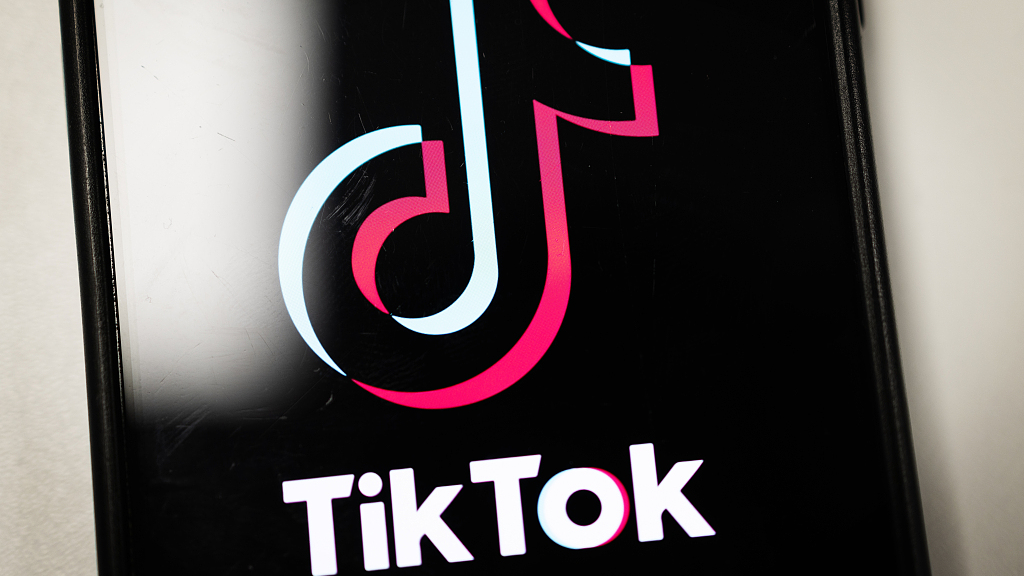
A log of TikTok. (Photo: CFP)
At the US House Energy and Commerce Committee hearing in Washington on Thursday, TikTok CEO Shou Zi Chew was questioned by lawmakers who expressed deep distrust in China's influence and data privacy.
Chew repeatedly denied their accusations during more than five hours of testimony.
Members of Congress interrupted the chief executive’s testimony and seemed uninterested in his answers.
"Very sad to watch that they are just bullying him, not letting him to speak," YouTube user Think First commented during the live broadcast of Chew's testimony.
In a post-hearing statement, TikTok said, "Shou came prepared to answer questions from Congress … unfortunately, the day was dominated by political grandstanding that failed to acknowledge the real solutions already underway."
The hearing was harsher in tone than previous congressional hearings featuring American executives of social media companies, The New York Times reported.
The Chinese government attaches high importance to data privacy and security and had never asked, nor would ever ask, any company to provide data or intelligence located in foreign countries, Chinese Ministry of Foreign Affairs spokesperson Mao Ning said on Friday.
"The US should respect the principles of the market economy and fair competition, stop suppressing foreign companies and provide an open, fair, just and non-discriminatory environment for foreign businesses to invest and operate in the US," Mao said.
In 2021, over 20 percent of Americans use TikTok, with most users ranging from 18 to 29 years old, according to a study by the Pew Research Center.
"A complete TikTok ban in the US would risk political and popular backlash from its young user base and civil liberties groups", reported The Associated Press.
A poll released by Quinnipiac University on March 15 showed 33 percent support and 63 percent opposition from US citizens aged 18 to 34 to a national ban on the app.
Representative Jamaal Bowman of New York joined two colleagues and dozens of TikTok content creators on Wednesday in front of the Capitol to oppose the ban.
"The problem here is the isolation of TikTok because they're a Chinese company," he said. Behind him supporters held signs reading "Keep TikTok," "My teaching thrives on TikTok," and "My Art thrives on TikTok."
Callie Goodwin, who runs a greeting card company, told the China Daily that 95 percent of her orders come from TikTok followers.
"I'm so thankful that this app has given me the chance to grow my business and to seek this entrepreneurial journey that would not be possible without it."
A ban on TikTok would be "devastating" to her livelihood and other small businesses as well, she was quoted as saying.
In December President Joe Biden signed a bill to ban the app from government devices. The administration has threatened to ban the app in the US if its parent company won't sell it.
China responded to the Biden administration's demand for the first time on Thursday, saying it "firmly" opposed a forced sale of TikTok.
A sale or divestiture of TikTok would involve the export of technology and so it would need to obtain a license and approval from the Chinese government, according to a commerce ministry spokeswoman.
It has come under increased scrutiny in the past few years over alleged national security concerns that US users' data could be passed on to China.
The company survived a ban attempt by former president Donald Trump.
The Trump administration first proposed banning the short-form video app in 2020, but that effort was stopped by the federal courts, which questioned the validity of the claims about national security risks.
During the hearing, the lawmakers offered no evidence of TikTok harming US national security interests.
Chew talked up TikTok's ongoing efforts to protect US user data.
The company came up with the Project Texas plan to store American users' data on domestic servers run by Texas-based software giant Oracle.
As of October, all new US user data was being stored inside the country. The company started deleting all historic US user data from non-Oracle servers this month, in a process expected to be completed this year, Chew said.
On questions about TikTok's data collection practices, Chew also emphasized that the data TikTok collects is data "that's frequently collected by many other companies in our industry."
According to The New York Times' report, The Washington Post in 2020 worked with a privacy researcher to look under the hood at TikTok and concluded that the app does not appear to collect any more data than a typical mainstream social network.
The following year, Pellaeon Lin, a Taiwan-based researcher at the University of Toronto's Citizen Lab, performed another technical analysis that reached similar conclusions.


